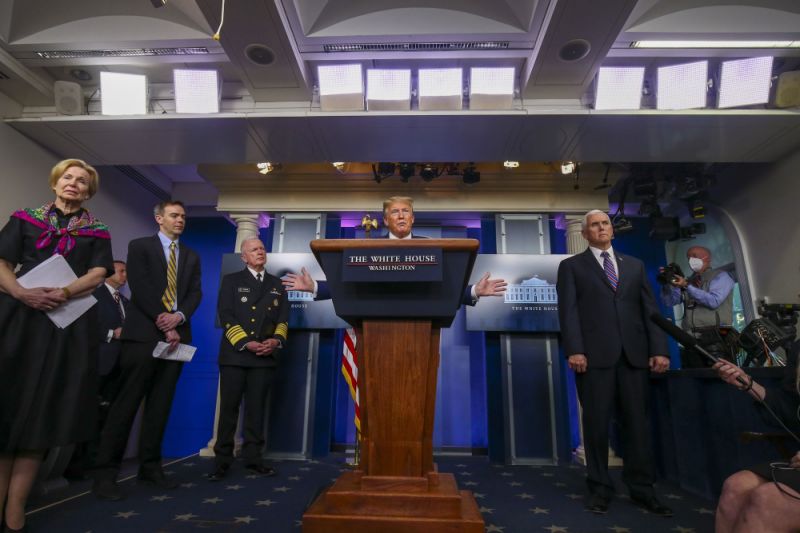
(Bloomberg) — Southern U.S. Republican governors are pushing to reopen their economies. President Donald Trump said he’ll sign an executive order temporarily suspending immigration, while Senate Democratic leader Chuck Schumer said a tentative deal was reached with the White House on emergency aid.
Singapore, once a standard bearer for taming the virus, reported more than 1,000 cases for a second day and will extend its partial lockdown for four more weeks. Italy will present a plan this week to ease rigid curbs, joining others in Europe pursuing a gradual return to normality.
Germany reported the smallest increase in infections this month. Still, Munich’s Oktoberfest festival was canceled for the first time since World War II, a sign that life won’t return to normal for months.
Key Developments
Virus Tracker: Cases top 2.4 million; deaths exceed 171,000How Singapore flipped from virus hero to cautionary taleU.S. Treasury hands out $2.9 billion to airlinesEurope tries to ease lockdowns with eye on new cases
Subscribe to a daily update on the virus from Bloomberg’s Prognosis team here. Click VRUS on the terminal for news and data on the coronavirus.
Humanitarian Fund Is Short (9:22 a.m. NY)
The heads of 15 international organizations, including the World Health Organization, wrote an open letter to the donor community saying a United Nations effort to raise $2 billion to help fight Covid-19 in the most vulnerable countries has so far raised only about a quarter of the goal. The World Food Programme needs more money to help pay for flights and shipments of medical supplies, and any delay may undermine efforts to control the coronavirus, the letter said.
EU Set to Prolong PPE Export Curbs (9:20 a.m. NY)
The European Union plans to prolong curbs on the export of personal protective equipment while narrowing the scope, EU Trade Commissioner Phil Hogan said. The restrictions, due to lapse on Saturday after six weeks, will be extended for 30 days, Hogan told a video-conference with the European Parliament’s trade committee. The current measures require an authorization for the export outside the bloc of goods including masks, gloves and garments.
Home Testing Kit Gets U.S. Approval (9:05 a.m. NY)
Laboratory Corp. of America Holdings gained U.S. authorization for the first home-testing kit for Covid-19. Patients will collect samples from their noses and send them to LapCorp for testing, the Food and Drug Administration said in a statement Tuesday.
The kits are expected to be available in most states with a doctor’s order in the coming weeks, according to the FDA. The agency said it worked with LabCorp to ensure the tests are as accurate as those done in a doctor’s office or hospital.
Pandemic Hits U.S. Earnings (9:04 a.m. NY)
HCA Healthcare Inc. suspended its quarterly dividend program and withdrew its outlook.
Philip Morris International Inc. abandoned its 2020 earnings guidance as the coronavirus outbreak weighs on duty-free tobacco sales, while Coca-Cola Co. said the impact of the pandemic on the second quarter will be “material.” International Business Machines Corp. shares fell after the company reported a drop in first-quarter revenue and pulled its full-year earnings outlook.
A UBS model suggests that U.S. companies’ earnings-per-share estimates for the next 12 months could be slashed by almost 15% in the coming eight weeks.
Schumer Says Aid Deal Reached; White House Says It’s Close (9:03 a.m. NY)
Senate Democratic leader Chuck Schumer said Tuesday his party’s congressional leaders and the Trump administration reached a tentative deal on an emergency economic rescue package that will replenish a tapped-out small business aid program and provide money for coronavirus testing and overwhelmed hospitals.
An administration official said Tuesday the sides were “very close” to a deal. A Senate Republican aide said no agreement had been reached yet.
U.K. May Post ‘Modest Contraction’ in First Quarter: Haldane (8:46 a.m. NY)
Economic figures for the first half of the year will probably be “very ugly,” Bank of England Chief Economist Andy Haldane said in a podcast with the Institute for Government. He said the second quarter will show a sharper contraction, and those patterns will be replicated across the world.
Separately, Prime Minister Boris Johnson’s spokesman, James Slack, told reporters on Tuesday that the government is standing by its testing target. At the beginning of April, Health Secretary Matt Hancock had pledged to get the daily testing rate up to 100,000. While capacity is now closing in on 40,000, a fourfold increase since the start of the month, finding people to test is proving more problematic.
“Clearly we need to make sure that that capacity is being used and that’s what we’re working on,” Slack said.
Netherlands New Cases Fall to Lowest Since March 23 (8:12 a.m. NY)
The Netherlands reported 729 new cases, the least in nearly a month, bringing the total up 2% to 34,134. Deaths rose by 4% to 3,916, while reported hospital admissions increased 1%, the RIVM National Institute for Public Health and the Environment said in its daily update.
Prime Minister Mark Rutte will announce late Tuesday whether lockdown measures in the country will be relaxed.
EU Health Commissioner Urges Caution (7:20 a.m. NY)
Governments in the European Union mustn’t be complacent even if the number of infections is stabilizing, EU Health Commissioner Stella Kyriakides said, urging caution in easing lockdown measures. Quick, uncoordinated exits risk jeopardizing the sacrifices of citizens and medical staff, she told members of the European Parliament’s health committee.
The EU is also boosting efforts to develop a vaccine. European Commission President Ursula von der Leyen will host an online pledging conference on May 4 to help fill funding gaps and mobilize investment necessary for research into effective therapeutics.
In a video-conference with his counterparts from Germany and Austria, Swiss Foreign Minister Ignazio Cassis called on neighbouring countries and the EU to proceed in a coordinated manner to ease restrictions as quickly as possible, according to a statement by the Bern-based government on Tuesday
Virus May Only Be a ‘Blip’ in German Mortality Rate (6:40 a.m. NY)
The new coronavirus will barely cause a “blip” in German mortality statistics if the country is able to keep its spread under control as well as it is now, the country’s public-health authority said.
“If we continue to control the virus as well as is currently the case, then we probably will barely see the effect on total deaths,” said Lars Schaade, vice president of the Robert Koch Institute. “This is different in other countries with a very large number of cases.” Schaade warned against complacency, saying Germans must keep up their guard until a vaccine is found. Some 95,200 people in Germany have recovered from the virus, more than any other nation, while 4,862 have died.
More European Countries Ease Lockdowns (6:20 a.m. NY)
Serbia eased one of Europe’s strictest coronavirus lockdown regimes, allowing small businesses to reopen and relaxing a daily curfew that had kept most citizens indoors since mid-March. In Croatia, citizens can now move within their county of residence and Slovenia opened some businesses on Monday, while Greek Prime Minister Kyriakos Mitsotakis will next week provide details on a plan for a return to normalcy.
Oil Meltdown Spreads Beyond Expiring Contracts (6 a.m. NY)
The meltdown in oil markets widened, with huge losses spreading beyond contracts affected by technical anomalies as the world runs out of places to store unwanted crude. West Texas Intermediate crude for May delivery plunged below zero on Monday for the first time in history, but the panic selling spread to the June contract on Tuesday, which briefly dropped as much as 42% to $11.79 a barrel.
The widening of the price collapse to futures that aren’t close to expiry underscored the severity of the crisis in the oil market. Storage tanks, pipelines and tankers are rapidly being overwhelmed by a vast oversupply caused by slumping fuel demand as countries are locked down to slow the spread of the coronavirus.
Earlier, Brent crude futures dropped below $20 a barrel, the lowest since 2002.
Belgian Hospital Admissions at One-Month Low (5:23 p.m. HK)
Belgian health officials reported 172 new hospitalizations in the past 24 hours, the lowest number since March 18. The number of ICU patients increased by 8 to 1,079. Fatalities rose by 170, including 78 suspected infections, to 5,998 after an increase of 168 the prior day. Belgium is one of few countries that also reports suspected virus fatalities which haven’t been confirmed by a diagnostic death.
Spain Cases Rise by Fewest in Three Days (5:18 p.m. HK)
There were 3,968 new infections in the 24 hours through Tuesday, taking the total to 204,178, according to Health Ministry data. The number of fatalities rose by 430, compared to Monday’s increase of 399, to 21,282. More than 80,000 have recovered from the disease in the world’s most extensive outbreak behind the U.S.
The numbers of new cases and deaths have dropped to about half their levels at the start of April, prompting the government to shift focus to a possible easing of lockdown measures. Still, gains are fragile and ending the lockdown will be a gradual process, Prime Minister Pedro Sanchez said at the weekend.
German Investors Confident Growth Will Return (5:16 p.m. HK)
Investors expressed confidence that Germany’s economy will start growing again in the third quarter, after the government started easing restrictions. While an assessment of current conditions in Europe’s largest economy plummeted to the lowest in more than a decade in April, expectations for the next six months climbed to the highest level since mid-2015.
“Financial-market experts are beginning to see a light at the end of the very long tunnel,” ZEW President Achim Wambach said in a statement. They indicated that they don’t expect output to return to pre-virus levels before 2022, he said.
Pandemic Sends England & Wales Death Toll to Record (4:47 p.m. HK)
The U.K. reported its highest weekly death count in records going back to 2010, as the damage caused by the coronavirus epidemic continues to rise. The Office For National Statistics said Tuesday there were 18,516 deaths registered in the week ending April 10, 76% more than the average figure for the same week over the previous five years. The excess deaths are significantly more than the ONS officially attributed to the virus, suggesting the official count may miss many deaths caused by the epidemic.
The British government has already faced scrutiny over the way it counts Covid-19 deaths. Figures published daily by the authorities only include deaths among the hospitalized, and unlike neighboring France, don’t track those in care facilities.
Singapore Pledges Extra $2.7 Billion (5:13 p.m. HK)
Singapore will extend its partial lockdown for another four weeks until June 1 to “decisively” bring down coronavirus cases within the community and close more workplaces and will provide an additional S$3.8 billion ($2.7 billion) to support businesses that are reeling from the fallout.
Authorities will scale up testing “substantially” to quickly detect any cases that pop up amid concerns over rising unlinked cases. Singapore will close more workplaces, with only the most essential services remaining open. Prime Minister Lee Hsien Loong said the city-state must press on to bring down daily infections more sharply, to single digit, or even zero.
The announcement comes as virus cases topped 1,000 for a second day, with 1,111 new cases reported on Tuesday as infections among foreign workers surge. Singapore was a global standard bearer for taming the virus in the early days of the pandemic. Now it’s home to Southeast Asia’s largest recorded outbreak and is racing to regain control. Rival financial hub Hong Kong, meanwhile, has seen a drop off in daily new infections, but is still extending social distancing restrictions for 14 days.
EU Industrial-Policy Chief Sounds Alarm Over Tourism (4:36 p.m. HK)
European Union industrial-policy chief Thierry Breton painted a bleak outlook for the EU tourism sector, saying it was hit early by the coronavirus outbreak and will suffer longer. Breton ruled out a normal holiday season this summer and announced a plan for a European tourism summit in September or October to address challenges for an industry that contributes around 10% to the EU economy.
“We are going to need massive amounts of funds,” he said in a video-conference with the European Parliament’s transport committee.
EU Must Share Cost or Pay Political Price (4:17 p.m. HK)
Governments must provide forceful and symmetric fiscal support in response to the crisis because weakness in one part of the region could ultimately depress growth and employment across the bloc, Executive Board member Fabio Panetta argued in a Politico op-ed. Financing costs should be pushed “very far” into the future, he added.
“Euro-zone countries should shoulder the cost of financing this crisis together, because they all stand to benefit by doing so,” Panetta said. “Failure to act now will not insulate taxpayers from the costs of this crisis. Quite the opposite: it will amplify those costs when they finally come due.”
The remarks come as European Union leaders prepare for a video-conference Thursday where they will discuss how to finance economic recovery efforts. In Panetta’s native Italy, resentment at the EU’s response to the pandemic has been running deep in recent weeks.
Pharming Soars on Drug Results (3:55 p.m. HK)
Pharming jumped as much as 41%, the most since 2014, after the company said its Ruconest drug showed encouraging results in five covid-19 patients hospitalized with severe pneumonia. The company now plans a multinational study with as many as 150 patients.
Russian Cases Rise 12%, Topping 50,000 (3:45 p.m. HK)
Confirmed coronavirus cases rose by 5,642 overnight to to 52,763 as the number of new daily cases stayed above 4,000 for the fifth consecutive day. The death toll reached 456, with 51 people dying overnight.
Russia’s underfunded and poorly equipped regional hospitals and clinics are emerging as hot spots for transmission as the outbreak spreads beyond the capital into the hinterlands. Moscow, which is entering its fourth week of shutdown, has seen the number of severely ill stabilize over the last 10 days.
German Oktoberfest Canceled (3:33 p.m. HK)
The annual Oktoberfest folk and beer festival in Munich originally scheduled to begin Sept. 19 has been canceled due to the coronavirus, Bavarian Premier Markus Soeder said.
“We agreed that the risk is simply too great,” Soeder said at a news conference. Munich Mayor Dieter Reiter said the event brings in around 1.2 billion euros ($1.3 billion) for local businesses, and that hotels, restaurants and taxi drivers would especially suffer.
The Oktoberfest, first celebrated in 1810, is one of the world’s biggest folk festivals and draws around 6 million visitors each year. Germany has banned large public gatherings until at least the end of August.
Italy Plans to Gradually Ease Lockdown From May 4 (2:12 p.m. HK)
Italy will present a plan this week to ease its lockdown, said Prime Minister Giuseppe Conte in a post on Facebook. “A reasonable forecast” is that a detailed restart program will be applied from May 4, Conte said.
Conte said that his cabinet is working with various experts to coordinate the so-called “phase 2” when Italy will have to cohabit with the coronavirus. The plan will be done at a national level but it will take into account regional differences, Conte said.
German Cases Rise the Least This Month (1:35 p.m. HK)
The number of coronavirus cases in Germany increased by the smallest amount this month as the country starts to gradually loosen restrictions on public life. There were 1,323 new infections in the 24 hours through Tuesday morning, taking the total to 147,065, according to data from Johns Hopkins University. Fatalities rose by 220, the most in three days, to 4,862.
Angela Merkel warned on Monday that the public debate about easing preventative measures brought in last month risks sparking a new wave of infections. In a closed-door meeting of her Christian Democratic Union party, the chancellor made it clear that her government doesn’t plan to introduce any further restrictions, though the option remains on the table.
Virus Wipes Out More Than 90% of International Flights (12:26 p.m. HK)
Airlines have cut international capacity to just half a million seats a week from an average of 5.9 million before the coronavirus shut borders and decimated travel demand, according to OAG Aviation Worldwide.
“There isn’t much more international capacity that can be dropped around the globe,” OAG senior analyst John Grant wrote in a post dated April 20. Strong domestic capacity has at least helped stem declines in countries such as the U.S., Japan and Indonesia, though demand is lacking, Grant said.
Indonesia Bans Mass Travel Ahead of Eid Festival (12:07 p.m HK)
Indonesia banned an annual ritual of citizens traveling in large numbers to their hometowns and villages ahead of the Muslim festival of Eid al-Fitr to prevent spread of coronavirus.
Health-care experts had called for a ban on the exodus, known as mudik, as it could spread the virus to more areas from the Greater Jakarta area, the nation’s epicenter of the outbreak. Roughly one out of every eight Indonesians head home ahead of Eid, the Muslim festival marking the end of Ramadan. An estimated 19.5 million people traveled to their hometowns from big cities like Jakarta during last year’s Eid, official data show.
Australia Sees ‘Road Back’ (11:58 a.m. HK)
Australia’s government said lockdown measures have led to a “sustained and consolidated” slowdown in new coronavirus cases, though cautioned there will be no easing of restrictions for at least three more weeks. The growth rate has been less than 1% for nine consecutive days and has averaged less than 0.5% for the past three days, Health Minister Greg Hunt said.
In a sign of the nation’s success in flattening the curve, the government announced that elective surgery will gradually resume starting next week — one of the first steps to reopening locked down sections of the economy.
<p class="canvas-atom canvas-text Mb(1.0em) Mb(0)–sm Mt(0.8em)–sm" type="text" content="For more articles like this, please visit us at bloomberg.com” data-reactid=”113″>For more articles like this, please visit us at bloomberg.com
<p class="canvas-atom canvas-text Mb(1.0em) Mb(0)–sm Mt(0.8em)–sm" type="text" content="Subscribe now to stay ahead with the most trusted business news source.” data-reactid=”114″>Subscribe now to stay ahead with the most trusted business news source.
©2020 Bloomberg L.P.














